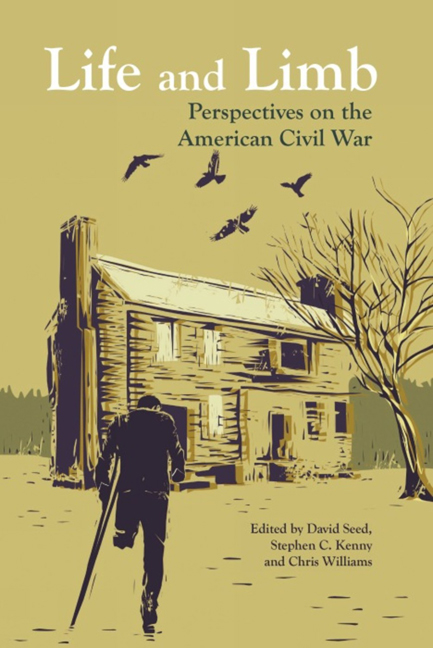Book contents
- Frontmatter
- Contents
- List of Illustrations
- Acknowledgements
- Introduction: Civil War Voices and Views
- MEDICAL AND SURGICAL MEMOIRS
- ACCOUNTS OF NURSING
- MEDICAL FACILITIES AND PATHOLOGY
- PHOTOGRAPHY
- AMPUTATIONS AND PROSTHETIC LIMBS
- IN THE FIELD OF BATTLE
- Diary: October 29, 1862: The Civil War Diary and Letters of Sergeant Henry W. Tisdale
- The Battle of Shiloh: Aftermath: ‘The Battle of Shiloh’ from Annals of the War
- The Battle of Ellyson's Mills: A Confederate Surgeon's Letters to His Wife Spencer Glasgow Welch
- Aftermath of Battle, Cedar Mountain, Virginia: ‘Personal Recollections of the War’
- After the Battle of Winchester: A Virginia Yankee in the Civil War
- The Negro as a Soldier
- Army Life in a Black Regiment
- POST-WAR NARRATIVES
- Contributors
- Select Bibliography
- Index
- Plates
Army Life in a Black Regiment
from IN THE FIELD OF BATTLE
- Frontmatter
- Contents
- List of Illustrations
- Acknowledgements
- Introduction: Civil War Voices and Views
- MEDICAL AND SURGICAL MEMOIRS
- ACCOUNTS OF NURSING
- MEDICAL FACILITIES AND PATHOLOGY
- PHOTOGRAPHY
- AMPUTATIONS AND PROSTHETIC LIMBS
- IN THE FIELD OF BATTLE
- Diary: October 29, 1862: The Civil War Diary and Letters of Sergeant Henry W. Tisdale
- The Battle of Shiloh: Aftermath: ‘The Battle of Shiloh’ from Annals of the War
- The Battle of Ellyson's Mills: A Confederate Surgeon's Letters to His Wife Spencer Glasgow Welch
- Aftermath of Battle, Cedar Mountain, Virginia: ‘Personal Recollections of the War’
- After the Battle of Winchester: A Virginia Yankee in the Civil War
- The Negro as a Soldier
- Army Life in a Black Regiment
- POST-WAR NARRATIVES
- Contributors
- Select Bibliography
- Index
- Plates
Summary
Thomas Wentworth Higginson (1823–1911) was a Unitarian minister and abolitionist. During the war he served as colonel in the 1st South Carolina Volunteers, the first regiment to be recruited from freed slaves. The Secretary of War stipulated that black regiments had to be commanded by white officers. Higginson was also one of the poet Emily Dickinson's correspondents. The following extract is taken from Higginson's Army Life in a Black Regiment (Boston: Fields, Osgood, 1870).
Introductory
I am under pretty heavy bonds to tell the truth, and only the truth; for those who look back to the newspaper correspondence of that period will see that this particular regiment lived for months in a glare of publicity, such as tests any regiment severely, and certainly prevents all subsequent romancing in its historian. As the scene of the only effort on the Atlantic coast to arm the negro, our camp attracted a continuous stream of visitors, military and civil. A battalion of black soldiers, a spectacle since so common, seemed then the most daring of innovations, and the whole demeanour of this particular regiment was watched with microscopic scrutiny by friends and foes. I felt sometimes as if we were a plant trying to take root, but constantly pulled up to see if we were growing. The slightest camp incidents sometimes came back to us, magnified and distorted, in letters of anxious inquiry from remote parts of the Union. It was no pleasant thing to live under such constant surveillance; but it guaranteed the honesty of any success, while fearfully multiplying the penalties had there been a failure. A single mutiny, such as has happened in the infancy of a hundred regiments, a single miniature Bull Run, a stampede of desertions, and it would have been all over with us; the party of distrust would have got the upper hand, and there might not have been, during the whole contest, another effort to arm the negro.
Camp Diary
December 29.
Our new surgeon has begun his work most efficiently: he and the chaplain have converted an old gin-house into a comfortable hospital, with ten nice beds and straw pallets. He is now, with a hearty professional faith, looking round for somebody to put into it. I am afraid the regiment will accommodate him; for, although he declares that these men do not sham sickness, as he expected, their catarrh is an unpleasant reality.
- Type
- Chapter
- Information
- Life and LimbPerspectives on the American Civil War, pp. 163 - 164Publisher: Liverpool University PressPrint publication year: 2015

